Array36 Restaurant
5449 Rosemead Blvd, Temple City, CA 91776
626-508-5886
www.array36.com
Sun 03/10/2024, 05:00p-09:25p
![Array 36 Exterior]()
My latest foray into the SGV brought me to a spot that's been making some waves in SoCal's Chinese dining scene over the past several months: Array 36, also known as 36宴 or 三十六宴 (sānshíliù yàn, "thirty-six banquets"). The place opened back in October last year, and is owned by a group of investors fronted by Xinze Zhang (Arthur Zhang), who's also behind the new Prime Hot Pot in Tustin (temporarily shuttered, I'm assuming due to accusations of culinary plagiarism from the Chubby Group).
Meanwhile, leading the back-of-the-house here is Chef Tony Tao, a.k.a. Jun Tao (陶軍, or táo jūn), a native of Shanghai who got interested in cooking at an early age, largely due to the influence of his mother, a dim sum chef. He started cooking professionally in Shanghai when he was 19, and soon began making a name for himself in the industry, winning numerous awards in the process. Tao eventually immigrated to the US, settling in Southern California, and headed up the kitchen at Shanghailander Palace. From July 2019 to September 2022, he was also CdC at Hong Bao Kitchen at the Yaamava' Resort & Casino, located on the San Manuel Reservation in San Bernardino.
![Array 36 Interior]()
Situated at edge of Temple City, near its border with San Gabriel, Array 36 occupies a large edifice that was previously home to the likes of Royal Tasty, Royal Noodle House, HK Grand Cafe, Fresh Qbake, Zen Buffet, Sizzler, and even Feathers Billiard Club. The space has been completely remodeled, resulting in probably the sleekest Chinese eatery LA has ever seen.
![Array 36 Medium Private Dining Room]()
![Array 36 Large Private Dining Room]()
The restaurant is also home to multiple private dining rooms of various sizes, which all feature a much lighter-toned aesthetic.
![Array 36 Menu: Appetizers]()
![Array 36 Menu: Live Seafood]()
![Array 36 Menu: Live Fish + Abalone, Sea Cucumber, Bird's Nest]()
![Array 36 Menu: Hot Entrees/ Signature Dishes]()
![Array 36 Menu: Hot Entrees/ Signature Dishes]()
![Array 36 Menu: Vegetables]()
![Array 36 Menu: Soup and Braised]()
![Array 36 Menu: Dim Sum and Desserts]()
![Array 36 Seasonal New Dishes Menu]()
Array 36's pan-Chinese menu is shown above, and is smaller than most, which I appreciate (I'm not a fan of super lengthy menus, since there's no way the kitchen can do everything well). Note also the assortment of seasonal specials, written solely in Chinese. Click for larger versions.
![Array 36 Beverage List]()
![Array 36 Beer & Wine List]()
Here we have the beverage selection, which includes quite possibly the saddest wine list I've ever seen at a restaurant at this price point (they don't even bother to list vintages!). Given the pitiful state of the booze situation here, you'll definitely want to make use of the corkage fee, which was $20 in total--an amazing deal. Click for larger versions.
![Complimentary Snacks]()
The small snacks oft served at the beginning of Chinese meals are typically not worth noting, but these were among the best I've had, and rather tasty in their own right. I was especially fond of the nutty spicing of the beans on the left.
![Moist Towel]()
A moistened napkin was certainly a welcomed nicety, one that I'd like to see more Chinese restaurants implement.
![2020 Domaine William Fèvre Chablis Grand Cru Vaudésir]()
As I mentioned above, we brought our own wines tonight (with everyone contributing a bottle), and first up was the lone white, the 2020 Domaine William Fèvre Chablis Grand Cru Vaudésir. I got an appealing bouquet packed with tropical fruit--pineapple in particular--but with a distinctly citrusy edge. On the palate, the Burgundy drank soft and smooth, with more of those clean, lean tropical notes evened out by steely minerals and touches of lemon.
![36宴特色话梅脆皮虾 (小) / Array 36 Signature Crispy Prawns in Plum Sauce (Small)]()
36宴特色话梅脆皮虾 (小) / Array 36 Signature Crispy Prawns in Plum Sauce (Small) [$19.00]
We started with the crispy shrimp, which featured wonderfully shattery shells, supple-springy insides, and a backbone of sweetness courtesy of the huà méi.
![港式特色脆皮乳鸽 (只) / Hong Kong-style Signature Crispy Squab (Each)]()
港式特色脆皮乳鸽 (只) / Hong Kong-style Signature Crispy Squab (Each) [$28.00 × 2]
The rǔ gē showed off some wonderfully glossy, crisp-rendered skin, while the meat was super juicy, with an impressive depth of flavor. This might actually be the strongest preparation of Chinese-style pigeon I've had.
![法式低温慢煮川味牛肋骨 / Slow-cooked Sichuan-style Beef Short Ribs à la Française]()
法式低温慢煮川味牛肋骨 / Slow-cooked Sichuan-style Beef Short Ribs à la Française [$88.00]
Beef ribs arrived soft and succulent, with a refined fattiness and sophisticated savor that really shined when taken with a dab of that dried spice mix on the right (cumin-chile?). We also had a somewhat yuzukosho-like chili dip, a super garlicky condiment of some sort, and what seemed like soy sauce. Also included, somewhat confusingly, was a bowl of corn-cheese, like what you might expect to find at your favorite KBBQ joint.
![2014 Silver Oak Cabernet Sauvignon Napa Valley]()
To pair with the course above, we went with the 2014 Silver Oak Cabernet Sauvignon Napa Valley, which stood up admirably to the meat. The nose here was all about dark fruits, but joined by a surprisingly potent amount of spice, which I didn't mind at all. Tasting it, I got a nice pepperiness up front, leading to round berry fruits and silky tannins, making for a surprisingly easy-going wine overall.
![水晶河虾仁 (小) / Shanghai-style Stir-fried River Shrimp with Signature Seasonings (Small)]()
水晶河虾仁 (小) / Shanghai-style Stir-fried River Shrimp with Signature Seasonings (Small) [$58.00]
Crystal shrimp were another highlight thanks to their gratifyingly bouncy mouthfeel and polished sweet 'n' saline flavors, which married perfectly with the tang of the accompanying vinegar.
![本帮响油鳝丝 (小) / Shanghainese Sautéed Eel in Special Sauce (Small)]()
本帮响油鳝丝 (小) / Shanghainese Sautéed Eel in Special Sauce (Small) [$38.00]
The eel displayed a pretty remarkable richness and depth that sort of wowed me, and I loved the zesty counterpoint offered up by the grated ginger. A surprise standout.
![上海蟹粉烩豆腐 (小) / Shanghai Crab Roe Stewed Tofu (Small)]()
上海蟹粉烩豆腐 (小) / Shanghai Crab Roe Stewed Tofu (Small) [$32.00]
Silky cubes of tofu played foil to the crabmeal's elegant presentation of oceany sweetness, perked up by what I believe was ginger. This would be pretty stupendous taken over some rice.
![2021 Beaux Frères Pinot Noir The Beaux Frères Vineyard]()
Our next wine was the 2021 Beaux Frères Pinot Noir The Beaux Frères Vineyard, which comes to us from Oregon's Willamette Valley. The bouquet on this one was impressively floral, with inky fruit augmented by tinges of pepper. Taking a sip, I found cool berry fruits, commixed with sweet-n-zippy spices, a healthy dosing of acidity, and refined tannins. Though this might be young, it was drinking great tonight.
![36宴特色烤鸭 (整只) / Array 36 Signature Roast Duck (Whole)]()
![36宴特色烤鸭 (整只) / Array 36 Signature Roast Duck (Whole)]()
36宴特色烤鸭 (整只) / Array 36 Signature Roast Duck (Whole) [$98.00]
Naturally, we had to try the běijīng kǎoyā, which we made sure to reserve well ahead of time. The duck arrived with some proper tableside theatrics, which included dousing it with báijiǔ and setting the whole thing ablaze. Once the fire petered out, the bird was carved and served...
![Duck Skin]()
...And up first were cuts of skin, gloriously thin and crunchy, and loaded with the pure, concentrated essence of duck fat.
![Crêpes]()
Stretchy pancakes served as the perfect vessel for the duck meat and its various trimmings.
![2012 Clos Apalta Vinothèque]()
For our next wine, we traveled down to Chile's Colchagua Valley for the 2012 Clos Apalta Vinothèque, a Carménère-dominated Bordeaux-style blend that was late-released in 2022. The nose here was strong in cedar, in concert with dark red fruits. On the palate, I found a great pepperiness right up front, joined by herb, more berries, and more cedar, all set over a layer of drying tannins.
![Duck Meat]()
The meat of duck was then presented. It was marvelous, showcasing that deep, anatine funk that I was hoping for in a tender, utterly juicy package, replete with more of that flavorful skin. This may very well be the best Peking duck I've had.
![Duck Accompaniments]()
The duck was delicious alone, but harmonized perfectly with its accoutrements, which included brown sugar, sweet bean sauce, batonnets of cucumber, Asian pear, and spring onion.
![Smoking Duck]()
![Smoked Duck Meat]()
Finally, a portion of duck was covered with a bell jar and smoked, which imparted a wonderful woodsiness to the meat that wasn't strictly necessary, but was indeed very welcomed. The key was really how the smoke enhanced the bird's natural flavors without ever becoming overwhelming.
![2006 Château Pavie Decesse]()
My contribution this evening was the 2006 Château Pavie Decesse, which I'd actually purchased back in 2013. The Bordeaux smelled of rich dark fruits, but with a distinctly herby underpinning. That herbaceousness continued on to the palate, where it was joined more lush, juicy berries and supporting elements of leather and cacao. This was well-aged, but I imagine that the wine still has plenty of life left in it.
![大豆苗 (小) – 清炒 / Soybean Sprouts (Small) – Stir-fry]()
大豆苗 (小) – 清炒 / Soybean Sprouts (Small) – Stir-fry [$26.00]
Pea sprouts demonstrated a refreshingly al dente texture and a fresh, "green" taste undergirded by a savoriness that really hit the spot.
![蟹蟹芙蓉 (小) / Crabmeal With Egg White (Small)]()
蟹蟹芙蓉 (小) / Crabmeal With Egg White (Small) [$26.00]
Compared to the similar crab dish above, this one conveyed that same delectably sweet brine, but was even more satisfying texturally due to the firmer nature of the egg whites. There was a nice bit of piquancy here as well, which worked great as an accent piece.
![36宴红烧肉 / Array 36 Signature Braised Pork (Small)]()
36宴红烧肉 / Array 36 Signature Braised Pork (Small) [$38.00]
Our final savory dish was the hóngshāo ròu, which featured meltingly fatty, gelatinous chunks of red braised pork belly, positively teeming with those classic, sticky, porcine flavors I was looking for.
![1970 Caves Messias Porto Vintage Quinta do Cachão]()
For dessert wine duties, I also brought along the 1970 Caves Messias Porto Vintage Quinta do Cachão, which I was very curious to try. The port displayed an appealing nose rife with chocolate and red fruit, with light florals. In terms of taste, I got tart, jammy fruit all over the place, with surprisingly little tertiary, and overall, I was a bit shocked at how remarkably young and vivacious this tasted despite being over 50 years old.
![酸奶玉兔慕斯 (个) / Yogurt Bunny Mousse (Each)]()
酸奶玉兔慕斯 (个) / Yogurt Bunny Mousse (Each) [$5.00]
This "jade rabbit" dessert exhibited the tangy, lactic qualities of yogurt in a cute, jiggly format.
![红糖酒酿芝麻汤圆 (2粒) (位) / Red Sugar Sweet Wine Sesame Glutinous Rice Balls (2/pcs) (Per Serving)]()
红糖酒酿芝麻汤圆 (2粒) (位) / Red Sugar Sweet Wine Sesame Glutinous Rice Balls (2/pcs) (Per Serving) [$6.00]
Supple spheres of tāngyuán had that nutty sweetness I wanted, all set in a brown sugar-boosted jiǔniàng broth.
![Tears of Llorona Tequila Extra Añejo]()
We closed out the evening with a digestif in the form of the Tears of Llorona Tequila Extra Añejo, an extra-aged expression matured for five years in a mix of brandy, scotch, and sherry barrels. The spirit smelled massively of peppery agave, accented by sweet vanilla and oak. Tasting it, I found lots of spice, along with cooked agave, as well as further elements of caramel, orchard fruit, and barrel.
I came into Array 36 with some pretty high expectations, and surprisingly, the restaurant actually managed to exceed them. In fact, I have to imagine that this is the closest we've gotten to a proper fine dining Chinese spot around these parts. I was legitimately impressed by how deep, developed, yet nuanced the flavors were, and I really got a sense of the care and consideration that went into the dishes. Indeed, I think I might've found my new favorite Chinese restaurant in the Los Angeles area--I just hope that the team can keep up the quality in the long-term.
5449 Rosemead Blvd, Temple City, CA 91776
626-508-5886
www.array36.com
Sun 03/10/2024, 05:00p-09:25p

My latest foray into the SGV brought me to a spot that's been making some waves in SoCal's Chinese dining scene over the past several months: Array 36, also known as 36宴 or 三十六宴 (sānshíliù yàn, "thirty-six banquets"). The place opened back in October last year, and is owned by a group of investors fronted by Xinze Zhang (Arthur Zhang), who's also behind the new Prime Hot Pot in Tustin (temporarily shuttered, I'm assuming due to accusations of culinary plagiarism from the Chubby Group).
Meanwhile, leading the back-of-the-house here is Chef Tony Tao, a.k.a. Jun Tao (陶軍, or táo jūn), a native of Shanghai who got interested in cooking at an early age, largely due to the influence of his mother, a dim sum chef. He started cooking professionally in Shanghai when he was 19, and soon began making a name for himself in the industry, winning numerous awards in the process. Tao eventually immigrated to the US, settling in Southern California, and headed up the kitchen at Shanghailander Palace. From July 2019 to September 2022, he was also CdC at Hong Bao Kitchen at the Yaamava' Resort & Casino, located on the San Manuel Reservation in San Bernardino.
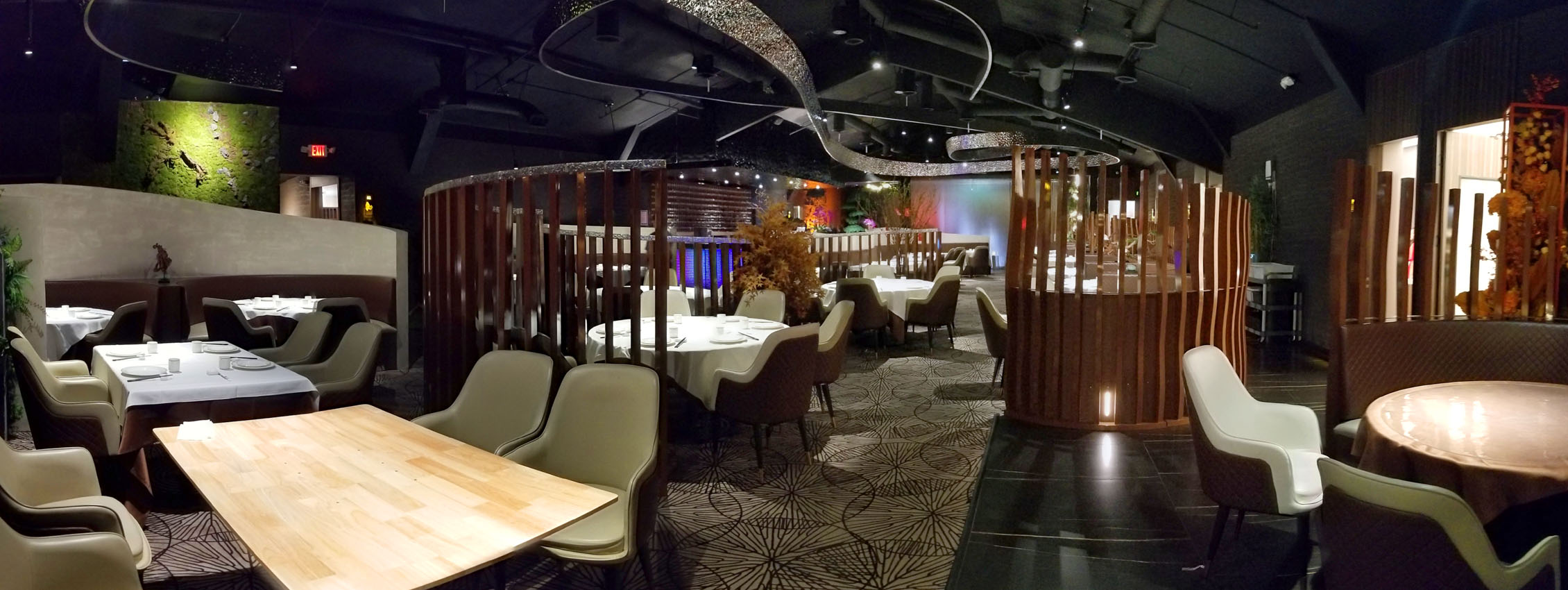
Situated at edge of Temple City, near its border with San Gabriel, Array 36 occupies a large edifice that was previously home to the likes of Royal Tasty, Royal Noodle House, HK Grand Cafe, Fresh Qbake, Zen Buffet, Sizzler, and even Feathers Billiard Club. The space has been completely remodeled, resulting in probably the sleekest Chinese eatery LA has ever seen.
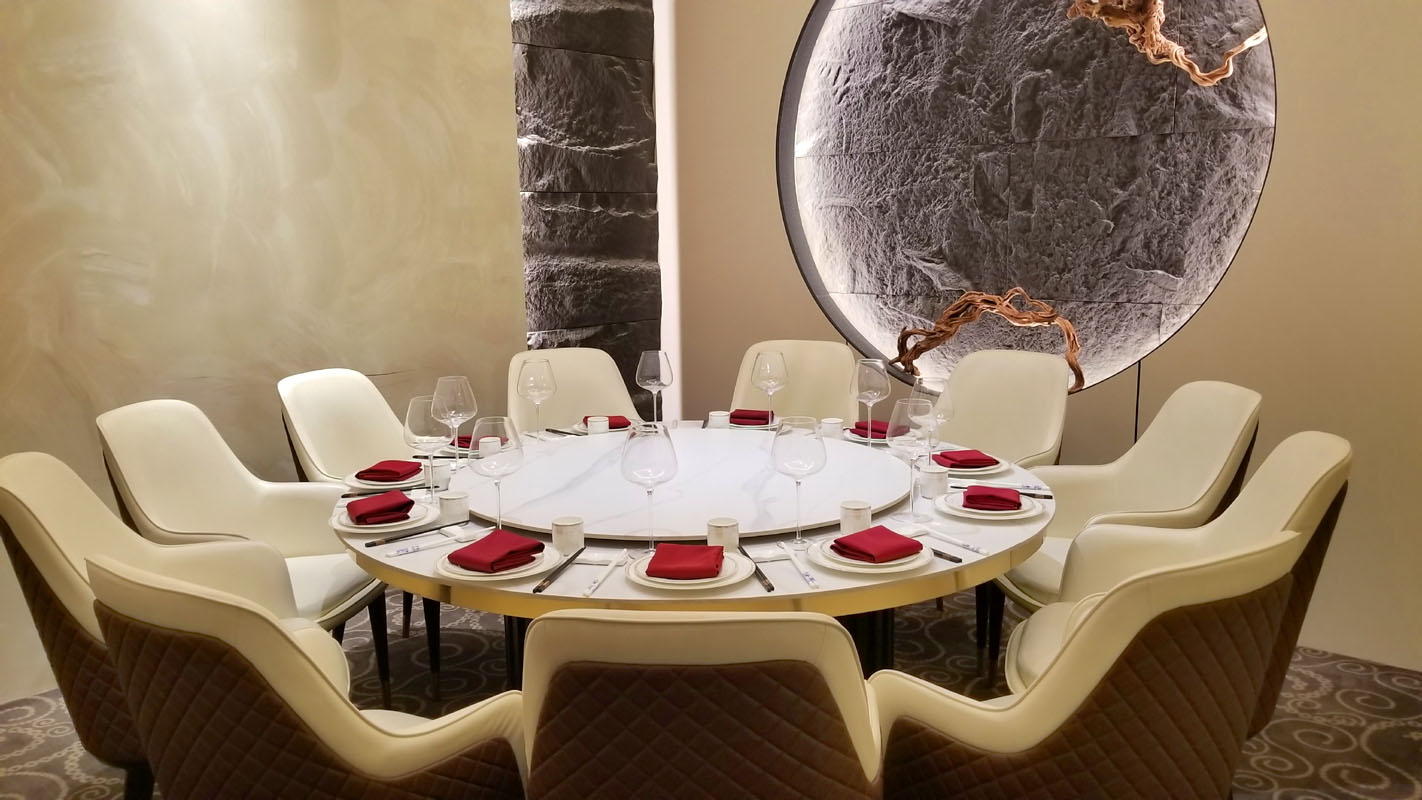
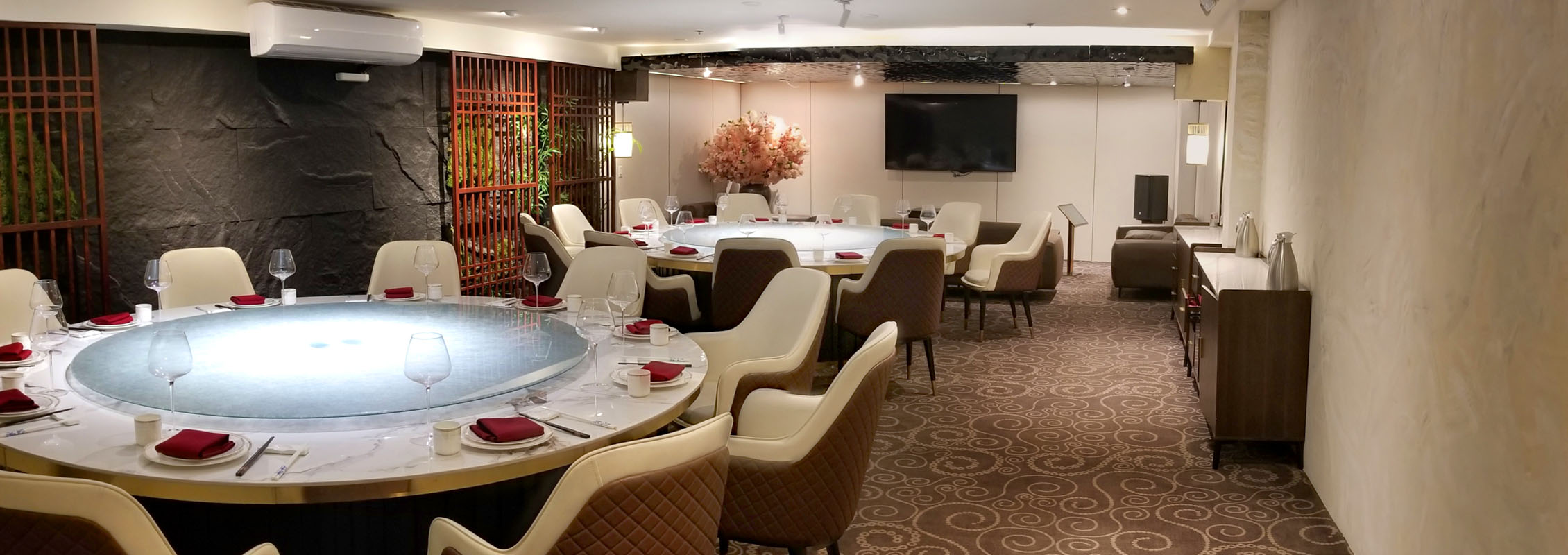
The restaurant is also home to multiple private dining rooms of various sizes, which all feature a much lighter-toned aesthetic.
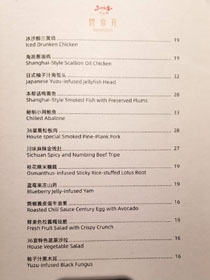
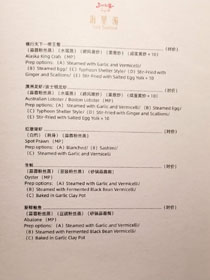
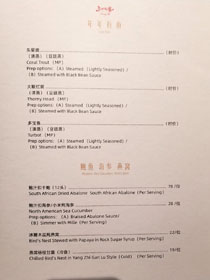
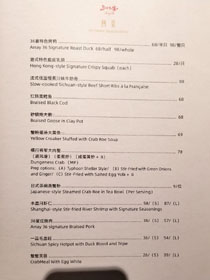
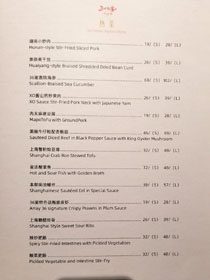
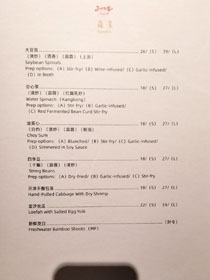
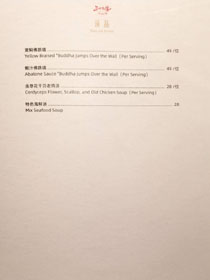
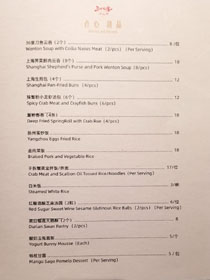
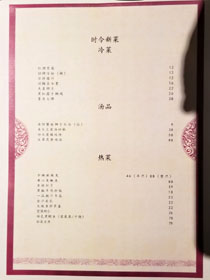
Array 36's pan-Chinese menu is shown above, and is smaller than most, which I appreciate (I'm not a fan of super lengthy menus, since there's no way the kitchen can do everything well). Note also the assortment of seasonal specials, written solely in Chinese. Click for larger versions.
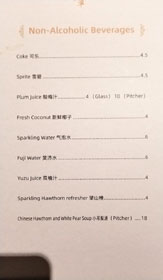
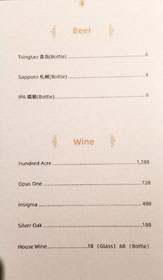
Here we have the beverage selection, which includes quite possibly the saddest wine list I've ever seen at a restaurant at this price point (they don't even bother to list vintages!). Given the pitiful state of the booze situation here, you'll definitely want to make use of the corkage fee, which was $20 in total--an amazing deal. Click for larger versions.
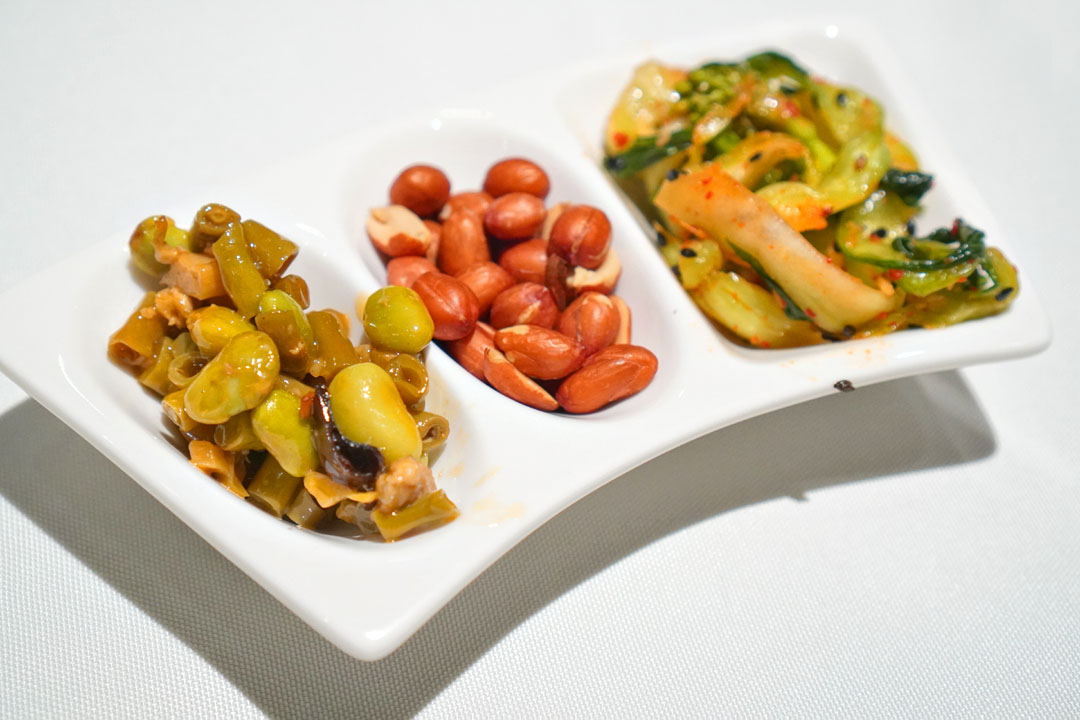
The small snacks oft served at the beginning of Chinese meals are typically not worth noting, but these were among the best I've had, and rather tasty in their own right. I was especially fond of the nutty spicing of the beans on the left.
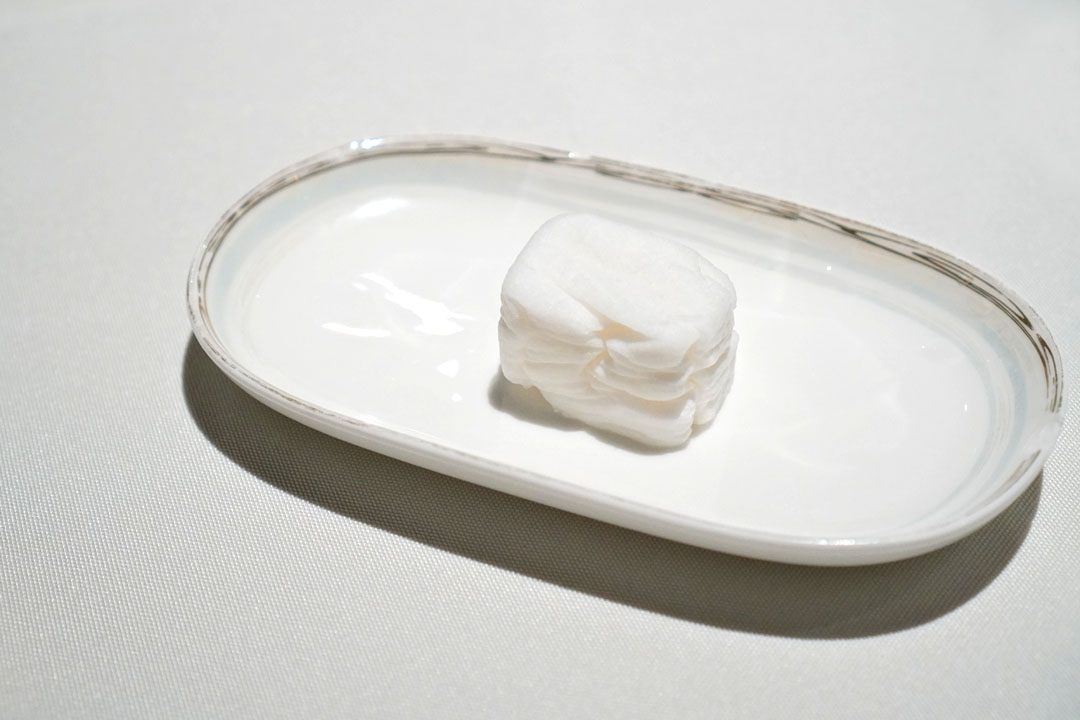
A moistened napkin was certainly a welcomed nicety, one that I'd like to see more Chinese restaurants implement.
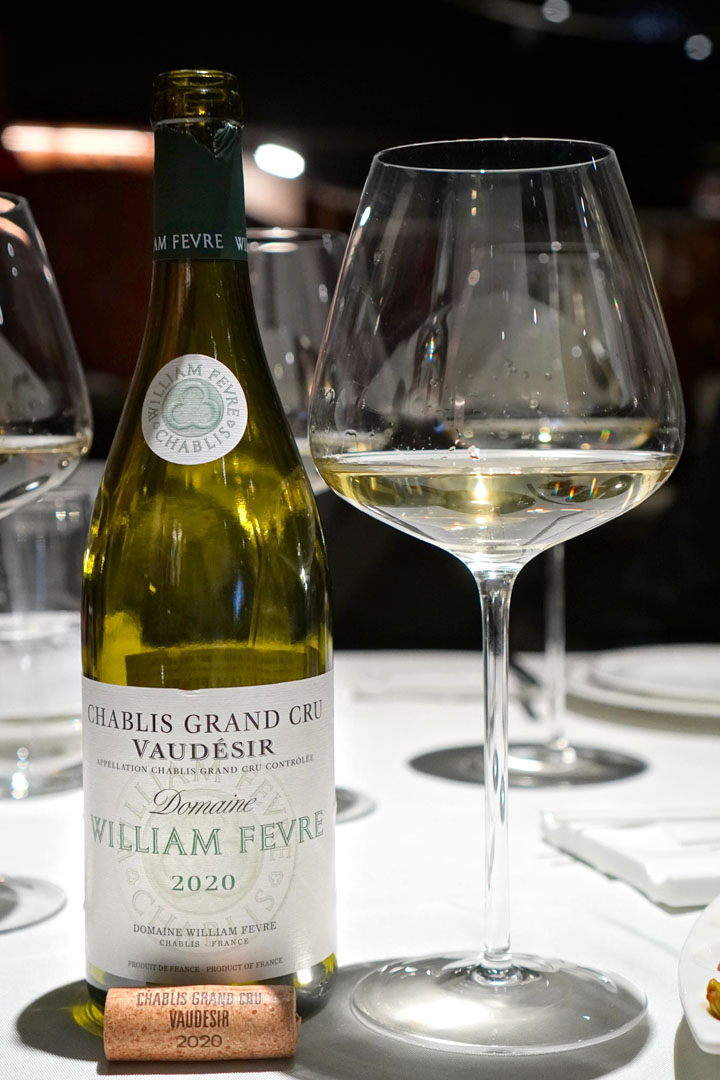
As I mentioned above, we brought our own wines tonight (with everyone contributing a bottle), and first up was the lone white, the 2020 Domaine William Fèvre Chablis Grand Cru Vaudésir. I got an appealing bouquet packed with tropical fruit--pineapple in particular--but with a distinctly citrusy edge. On the palate, the Burgundy drank soft and smooth, with more of those clean, lean tropical notes evened out by steely minerals and touches of lemon.
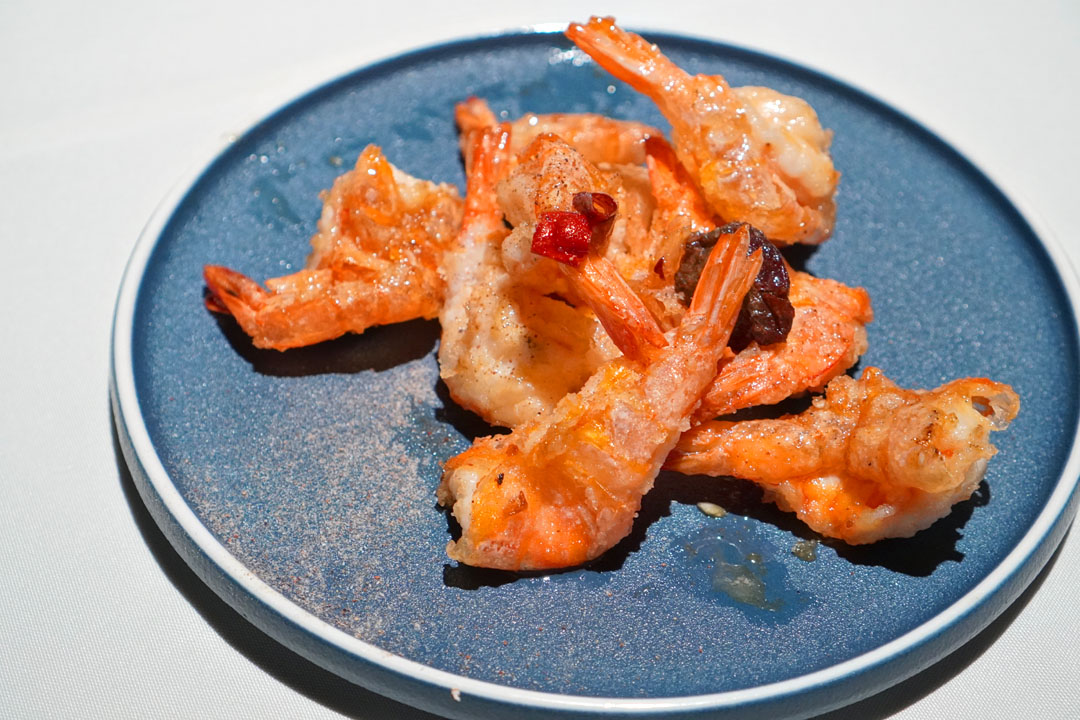
36宴特色话梅脆皮虾 (小) / Array 36 Signature Crispy Prawns in Plum Sauce (Small) [$19.00]
We started with the crispy shrimp, which featured wonderfully shattery shells, supple-springy insides, and a backbone of sweetness courtesy of the huà méi.
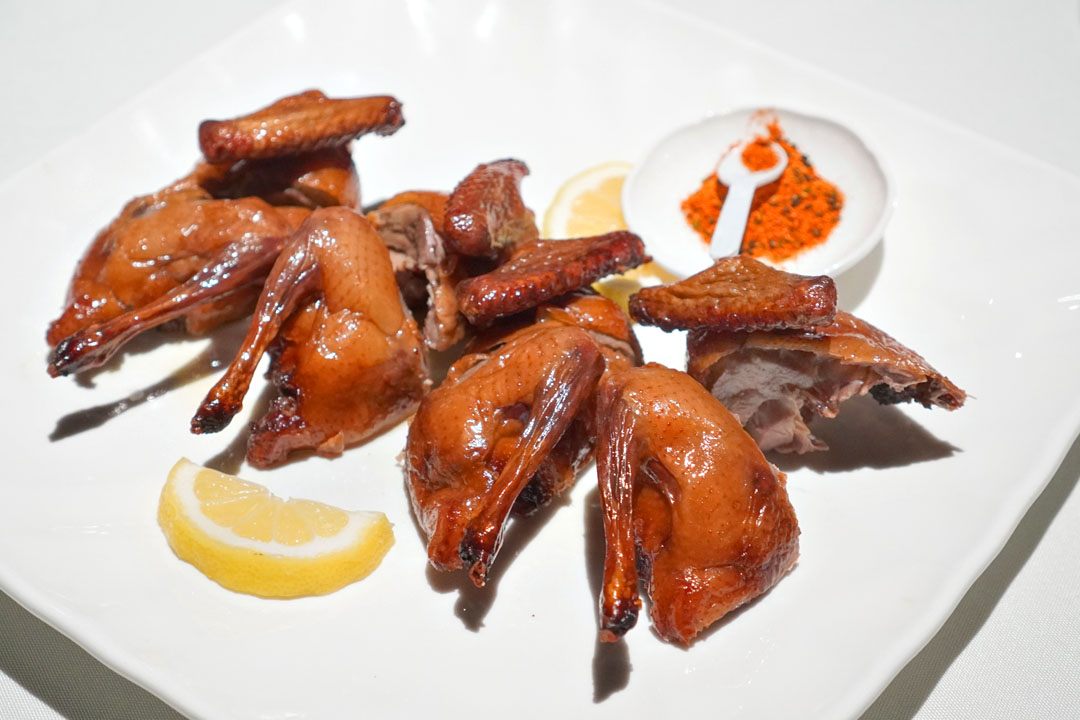
港式特色脆皮乳鸽 (只) / Hong Kong-style Signature Crispy Squab (Each) [$28.00 × 2]
The rǔ gē showed off some wonderfully glossy, crisp-rendered skin, while the meat was super juicy, with an impressive depth of flavor. This might actually be the strongest preparation of Chinese-style pigeon I've had.
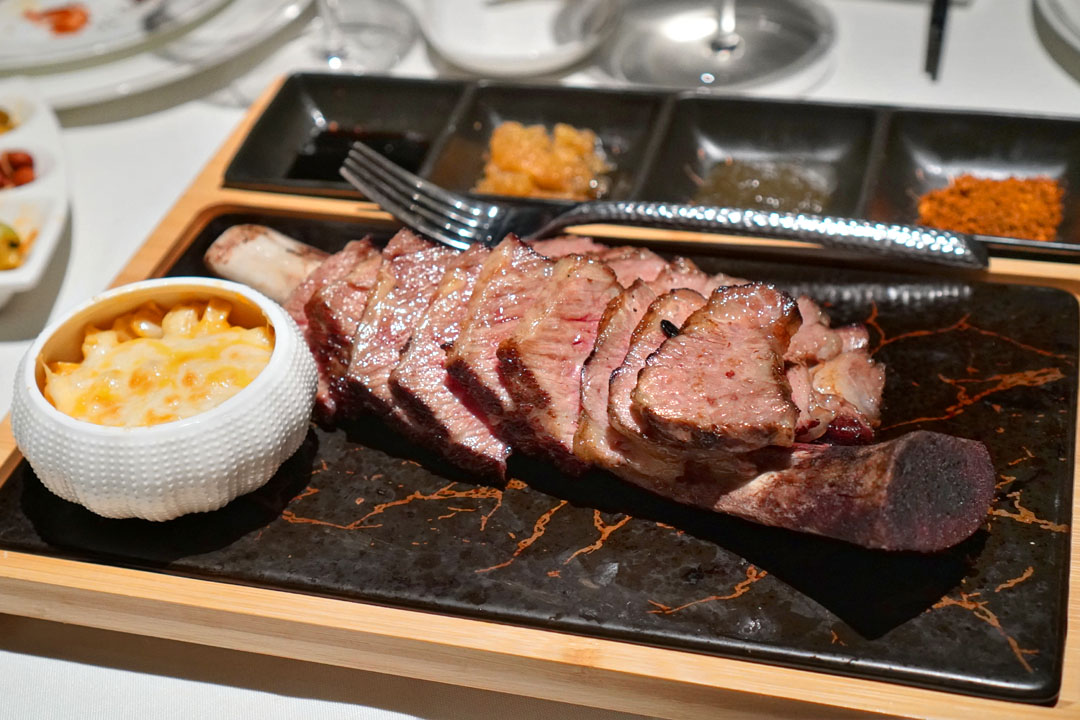
法式低温慢煮川味牛肋骨 / Slow-cooked Sichuan-style Beef Short Ribs à la Française [$88.00]
Beef ribs arrived soft and succulent, with a refined fattiness and sophisticated savor that really shined when taken with a dab of that dried spice mix on the right (cumin-chile?). We also had a somewhat yuzukosho-like chili dip, a super garlicky condiment of some sort, and what seemed like soy sauce. Also included, somewhat confusingly, was a bowl of corn-cheese, like what you might expect to find at your favorite KBBQ joint.
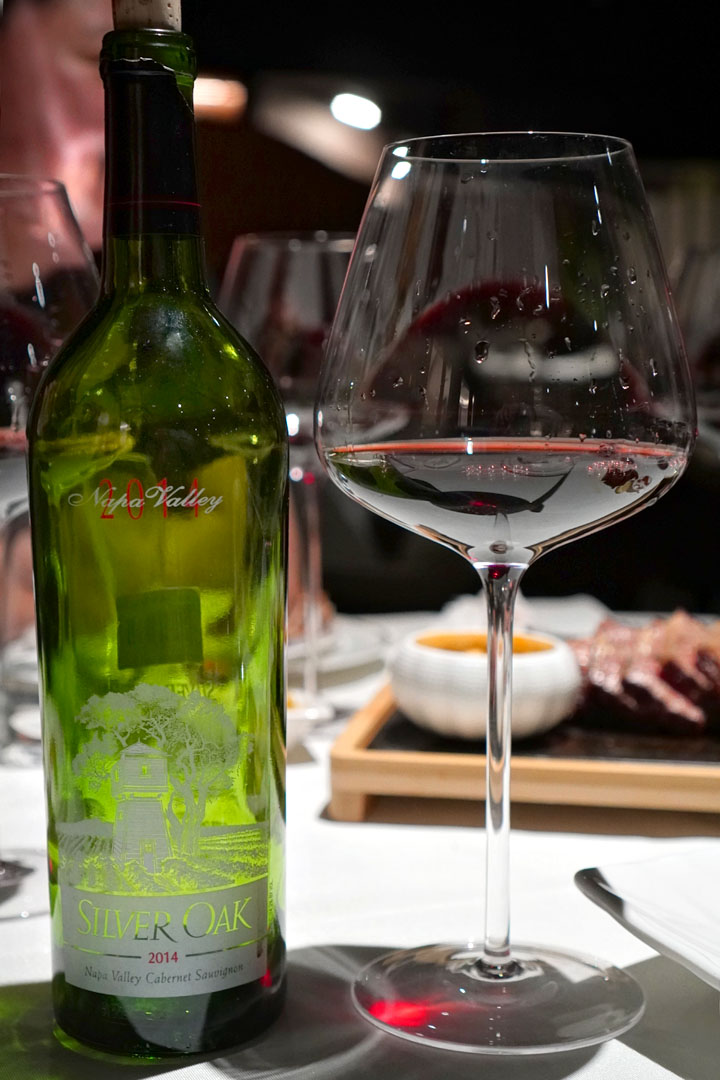
To pair with the course above, we went with the 2014 Silver Oak Cabernet Sauvignon Napa Valley, which stood up admirably to the meat. The nose here was all about dark fruits, but joined by a surprisingly potent amount of spice, which I didn't mind at all. Tasting it, I got a nice pepperiness up front, leading to round berry fruits and silky tannins, making for a surprisingly easy-going wine overall.
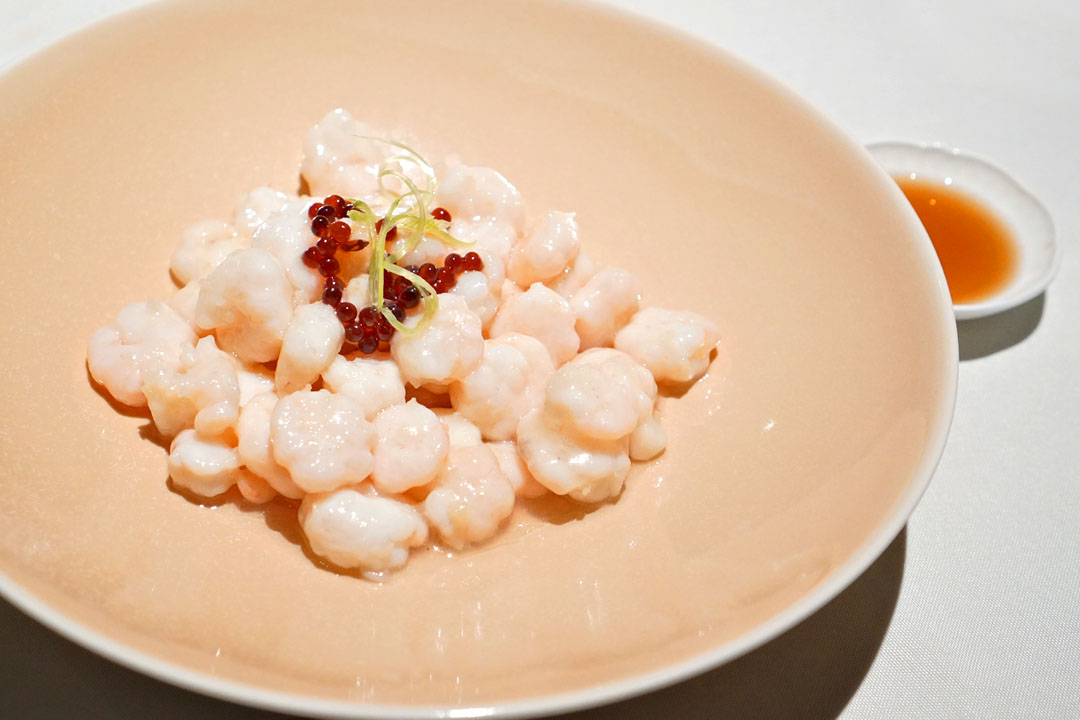
水晶河虾仁 (小) / Shanghai-style Stir-fried River Shrimp with Signature Seasonings (Small) [$58.00]
Crystal shrimp were another highlight thanks to their gratifyingly bouncy mouthfeel and polished sweet 'n' saline flavors, which married perfectly with the tang of the accompanying vinegar.
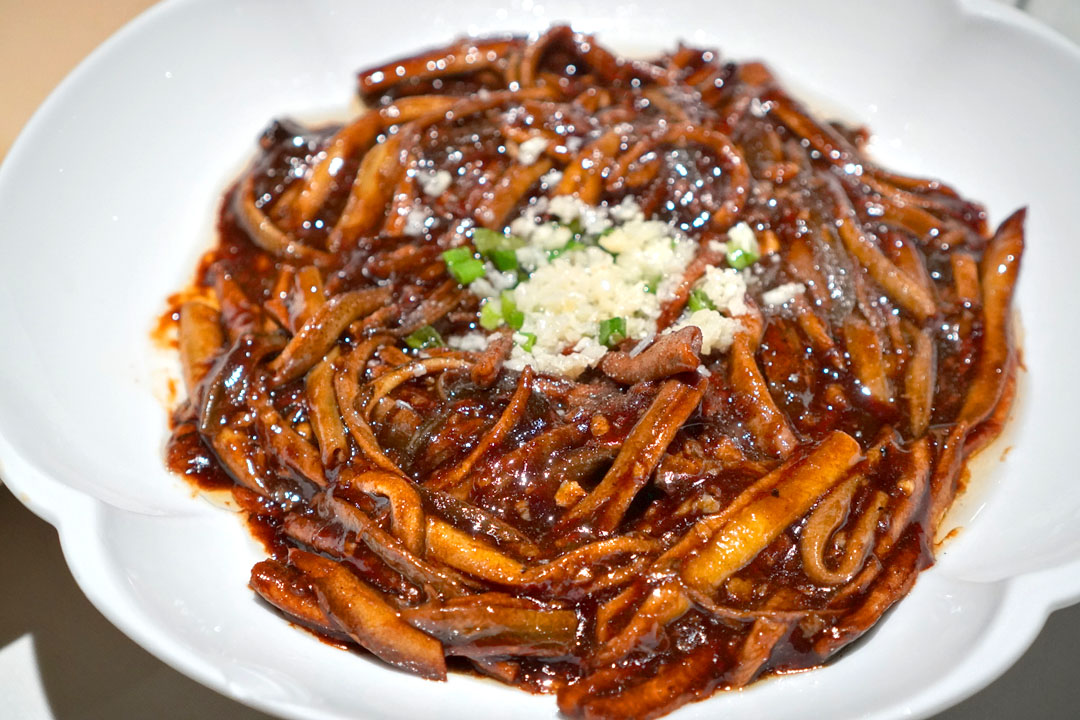
本帮响油鳝丝 (小) / Shanghainese Sautéed Eel in Special Sauce (Small) [$38.00]
The eel displayed a pretty remarkable richness and depth that sort of wowed me, and I loved the zesty counterpoint offered up by the grated ginger. A surprise standout.
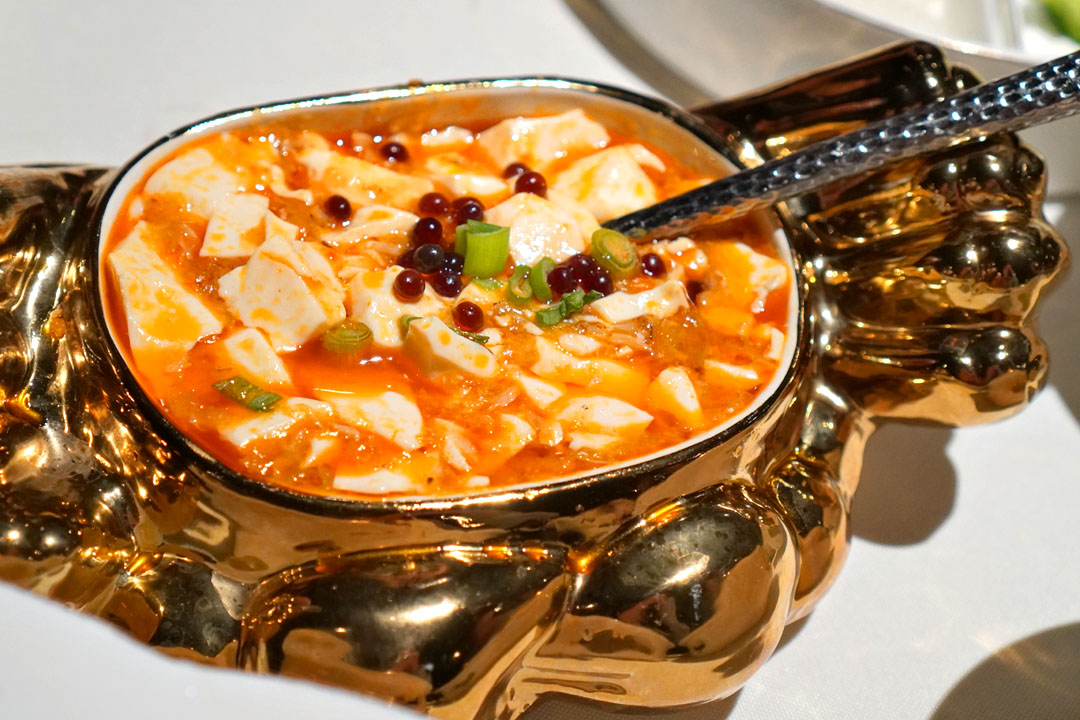
上海蟹粉烩豆腐 (小) / Shanghai Crab Roe Stewed Tofu (Small) [$32.00]
Silky cubes of tofu played foil to the crabmeal's elegant presentation of oceany sweetness, perked up by what I believe was ginger. This would be pretty stupendous taken over some rice.
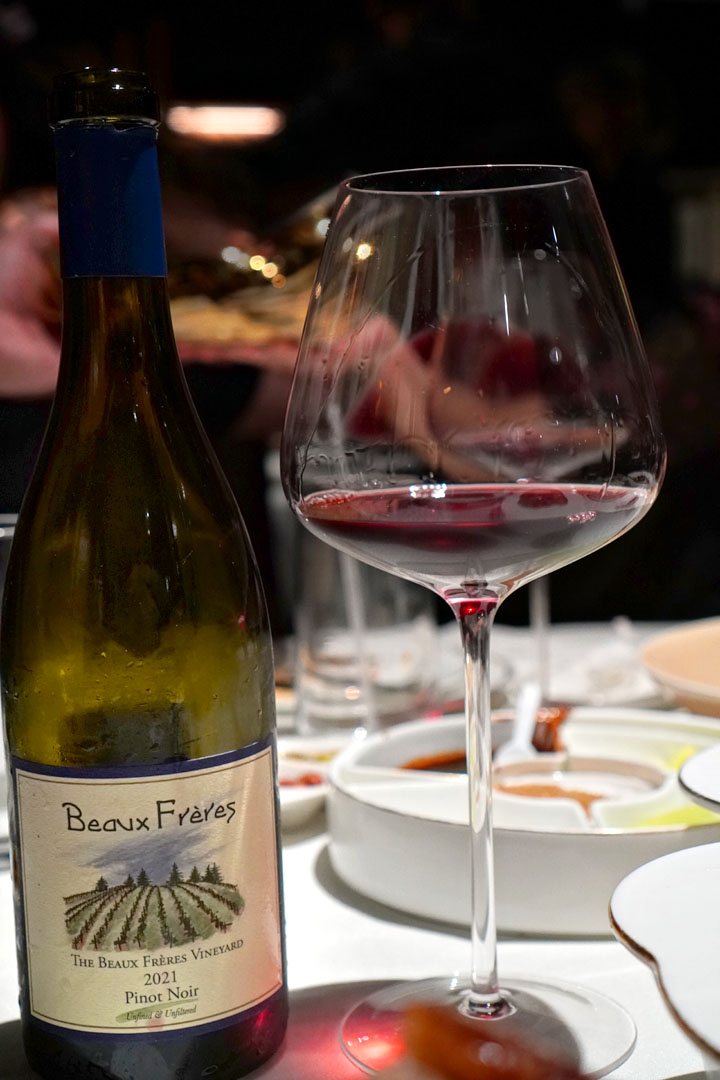
Our next wine was the 2021 Beaux Frères Pinot Noir The Beaux Frères Vineyard, which comes to us from Oregon's Willamette Valley. The bouquet on this one was impressively floral, with inky fruit augmented by tinges of pepper. Taking a sip, I found cool berry fruits, commixed with sweet-n-zippy spices, a healthy dosing of acidity, and refined tannins. Though this might be young, it was drinking great tonight.
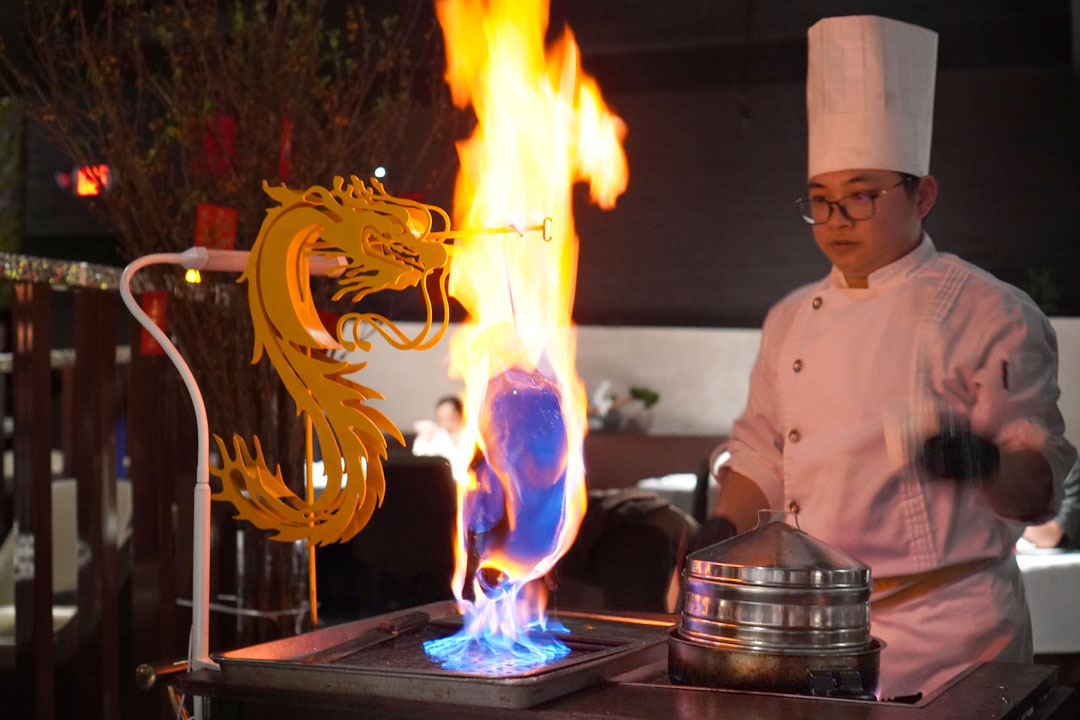
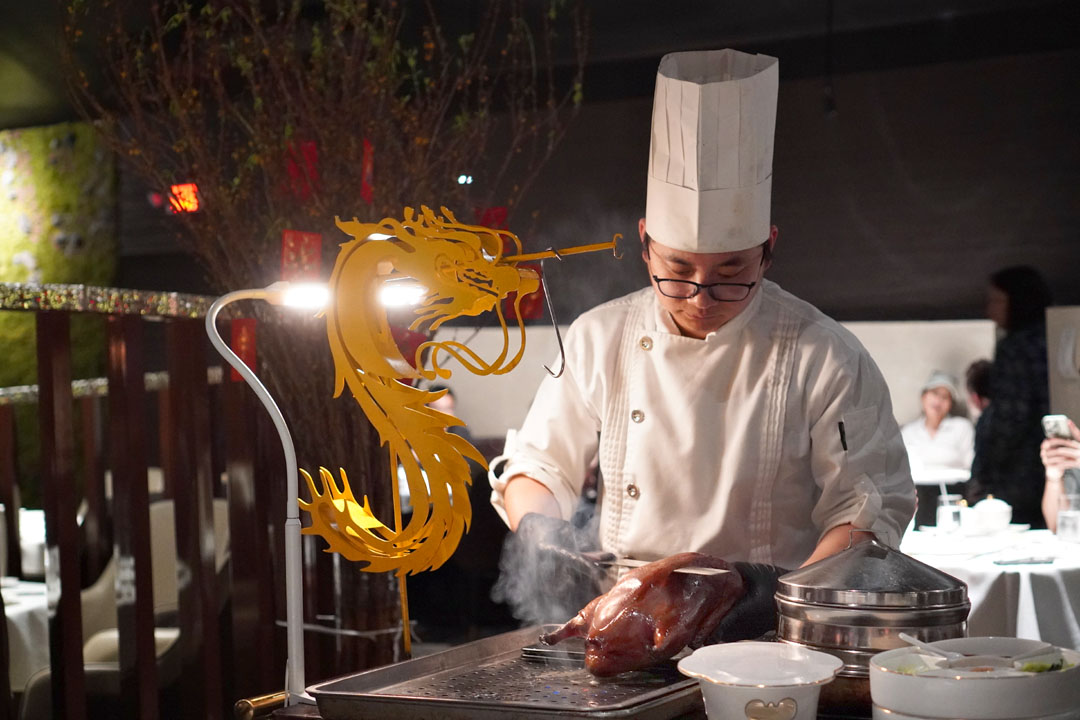
36宴特色烤鸭 (整只) / Array 36 Signature Roast Duck (Whole) [$98.00]
Naturally, we had to try the běijīng kǎoyā, which we made sure to reserve well ahead of time. The duck arrived with some proper tableside theatrics, which included dousing it with báijiǔ and setting the whole thing ablaze. Once the fire petered out, the bird was carved and served...
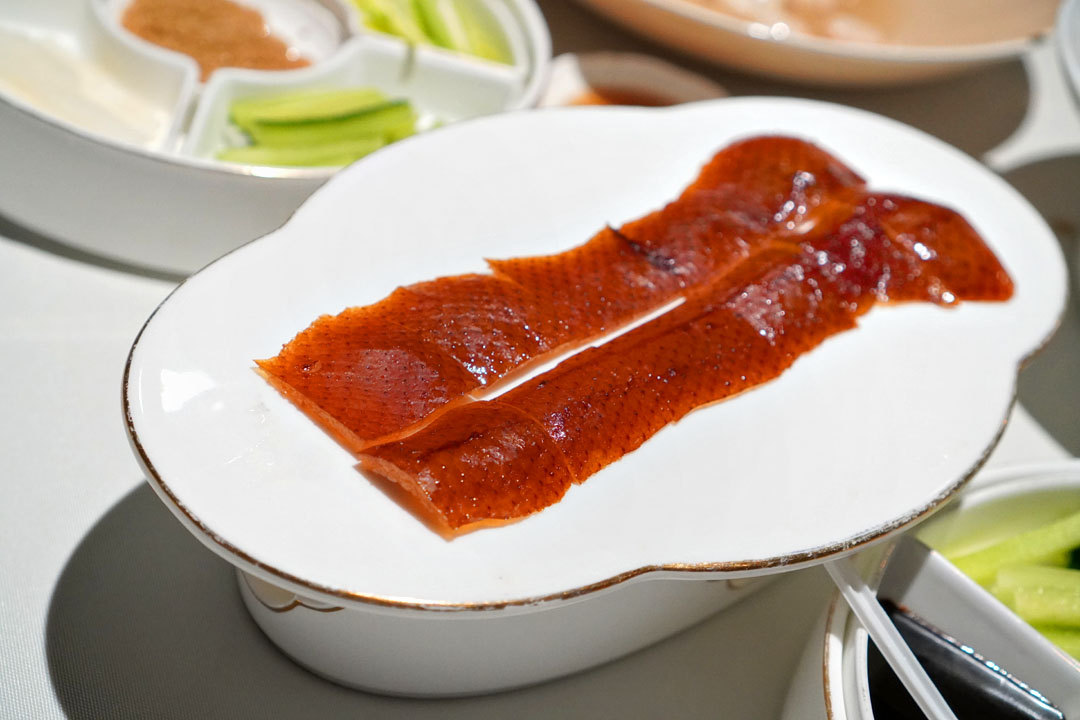
...And up first were cuts of skin, gloriously thin and crunchy, and loaded with the pure, concentrated essence of duck fat.
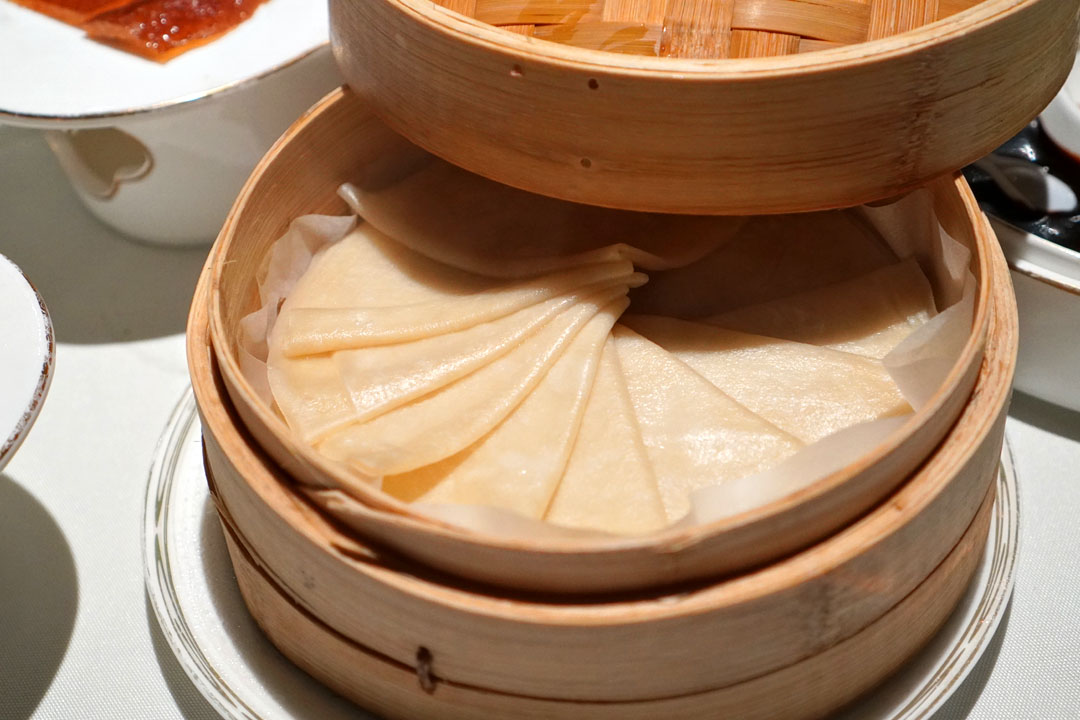
Stretchy pancakes served as the perfect vessel for the duck meat and its various trimmings.
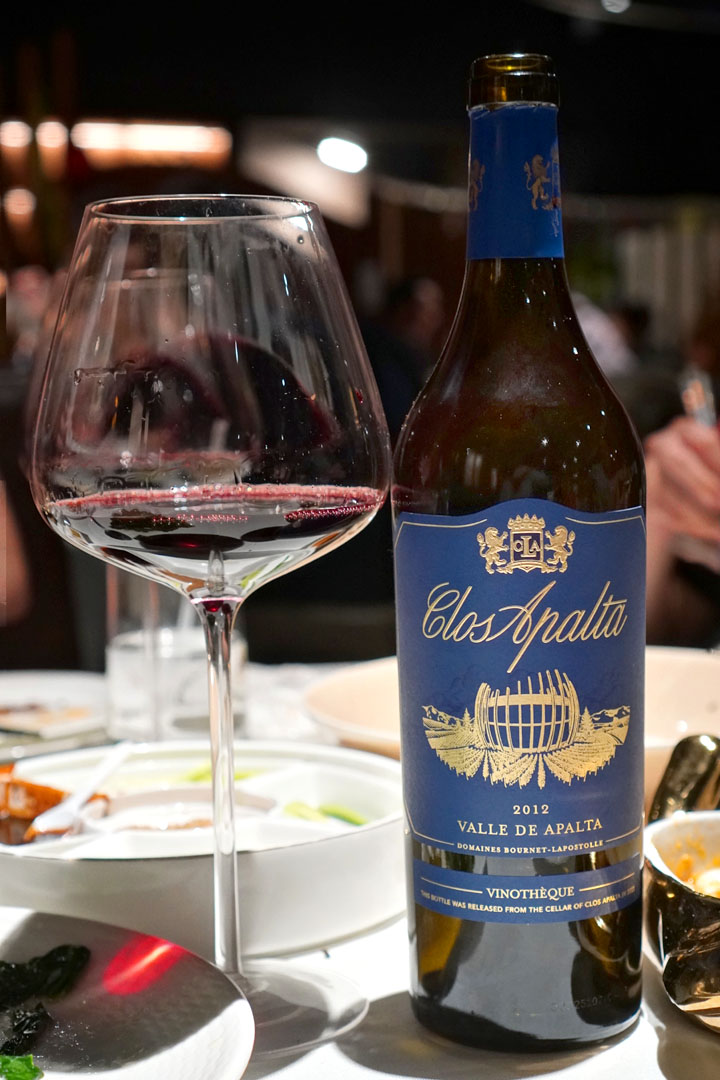
For our next wine, we traveled down to Chile's Colchagua Valley for the 2012 Clos Apalta Vinothèque, a Carménère-dominated Bordeaux-style blend that was late-released in 2022. The nose here was strong in cedar, in concert with dark red fruits. On the palate, I found a great pepperiness right up front, joined by herb, more berries, and more cedar, all set over a layer of drying tannins.
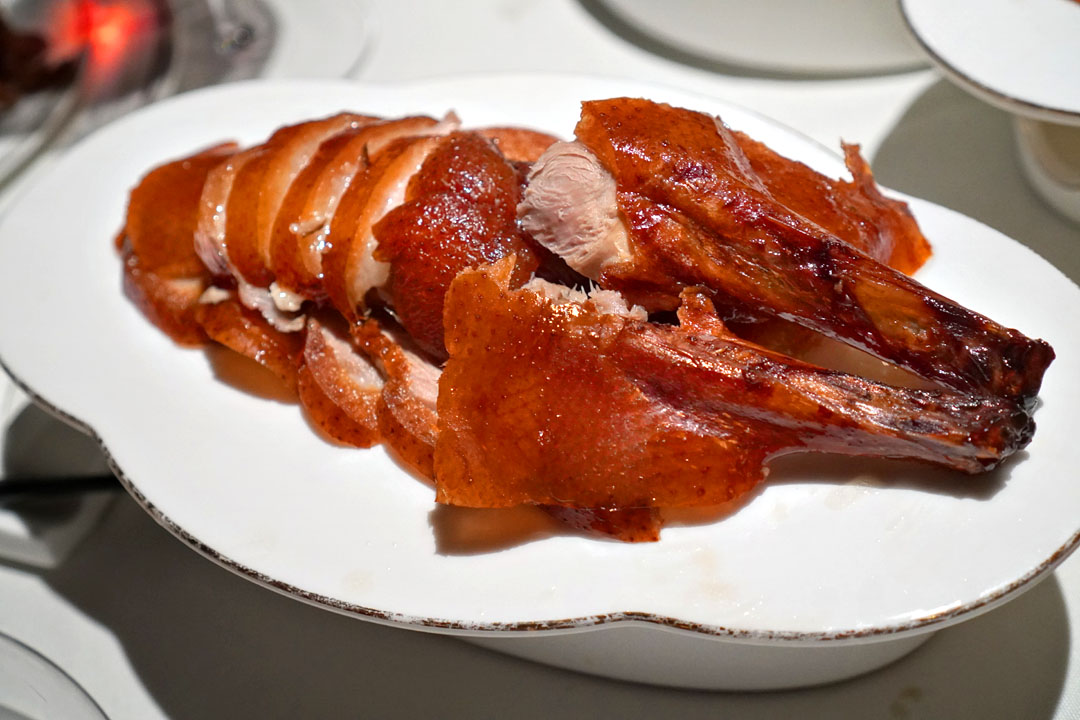
The meat of duck was then presented. It was marvelous, showcasing that deep, anatine funk that I was hoping for in a tender, utterly juicy package, replete with more of that flavorful skin. This may very well be the best Peking duck I've had.
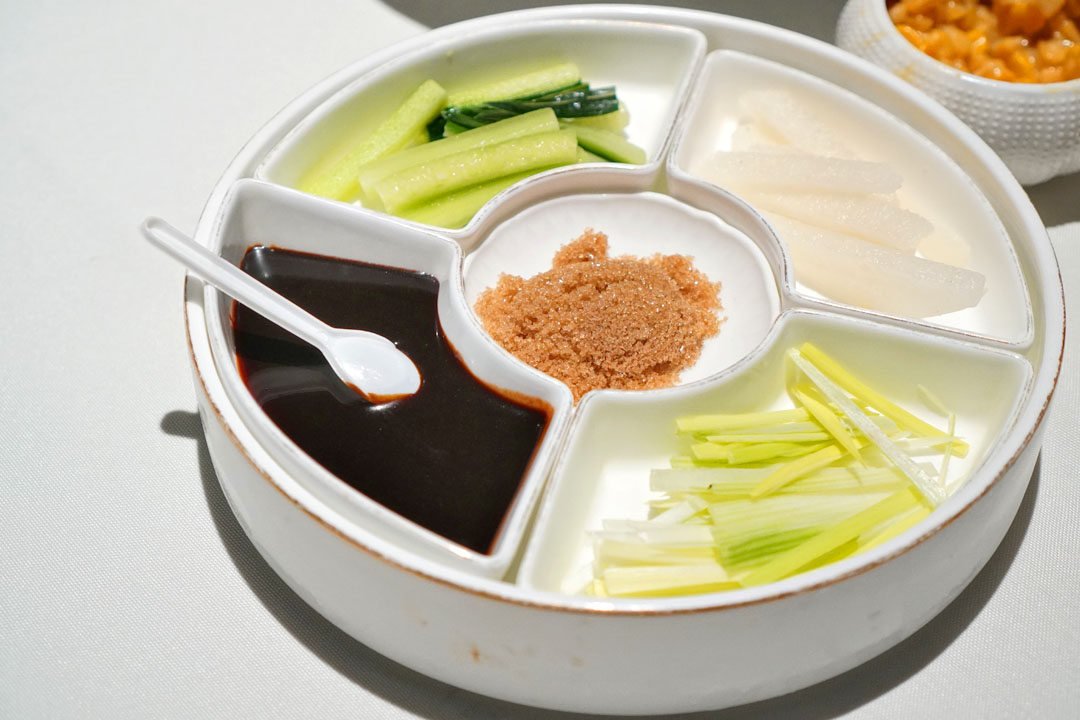
The duck was delicious alone, but harmonized perfectly with its accoutrements, which included brown sugar, sweet bean sauce, batonnets of cucumber, Asian pear, and spring onion.
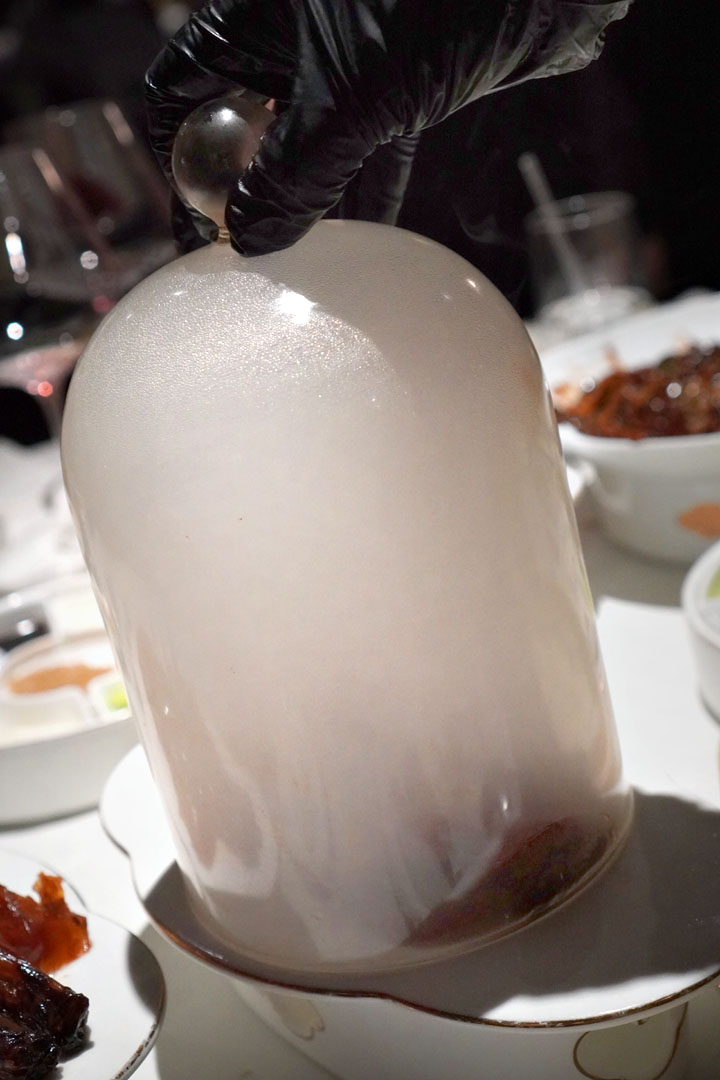
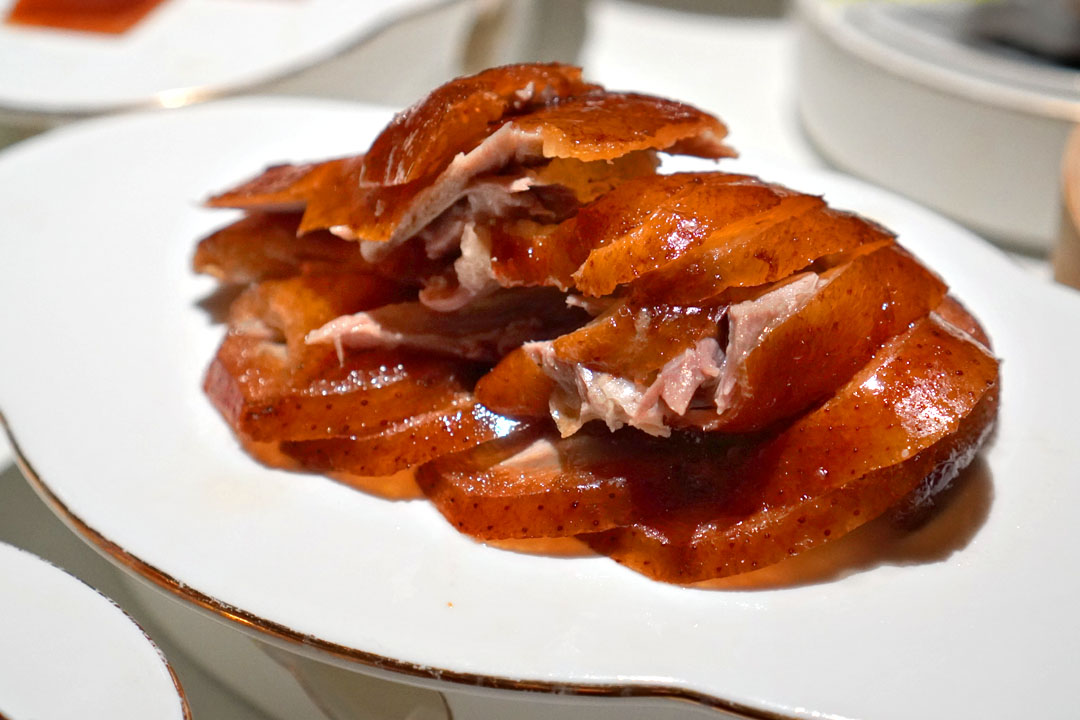
Finally, a portion of duck was covered with a bell jar and smoked, which imparted a wonderful woodsiness to the meat that wasn't strictly necessary, but was indeed very welcomed. The key was really how the smoke enhanced the bird's natural flavors without ever becoming overwhelming.
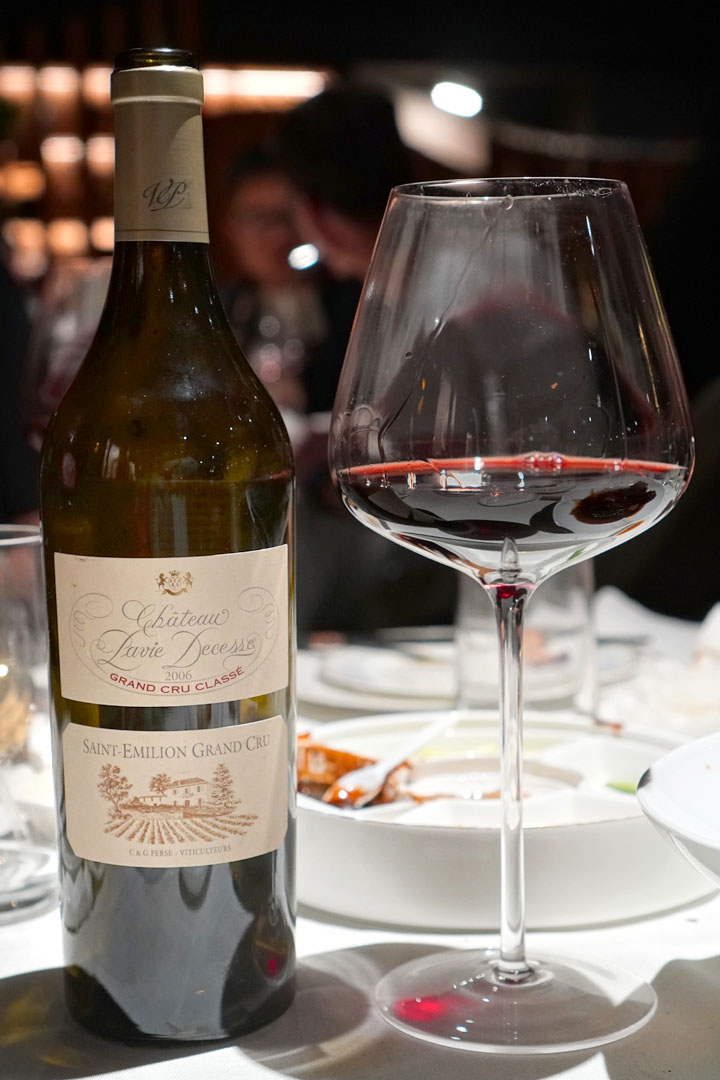
My contribution this evening was the 2006 Château Pavie Decesse, which I'd actually purchased back in 2013. The Bordeaux smelled of rich dark fruits, but with a distinctly herby underpinning. That herbaceousness continued on to the palate, where it was joined more lush, juicy berries and supporting elements of leather and cacao. This was well-aged, but I imagine that the wine still has plenty of life left in it.
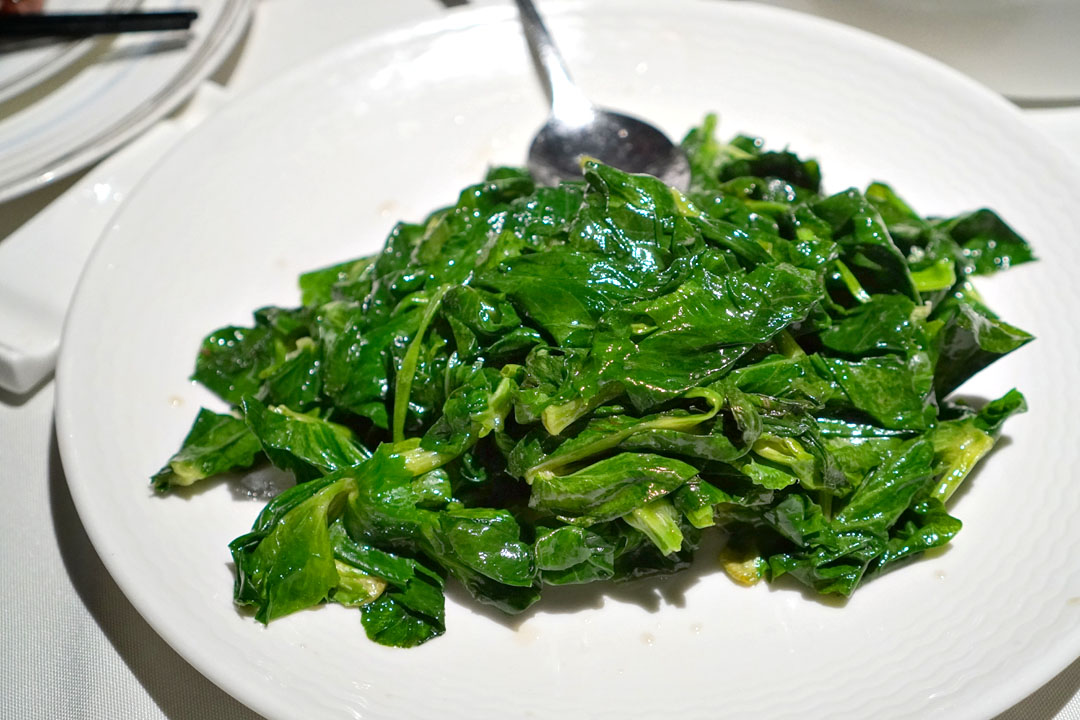
大豆苗 (小) – 清炒 / Soybean Sprouts (Small) – Stir-fry [$26.00]
Pea sprouts demonstrated a refreshingly al dente texture and a fresh, "green" taste undergirded by a savoriness that really hit the spot.
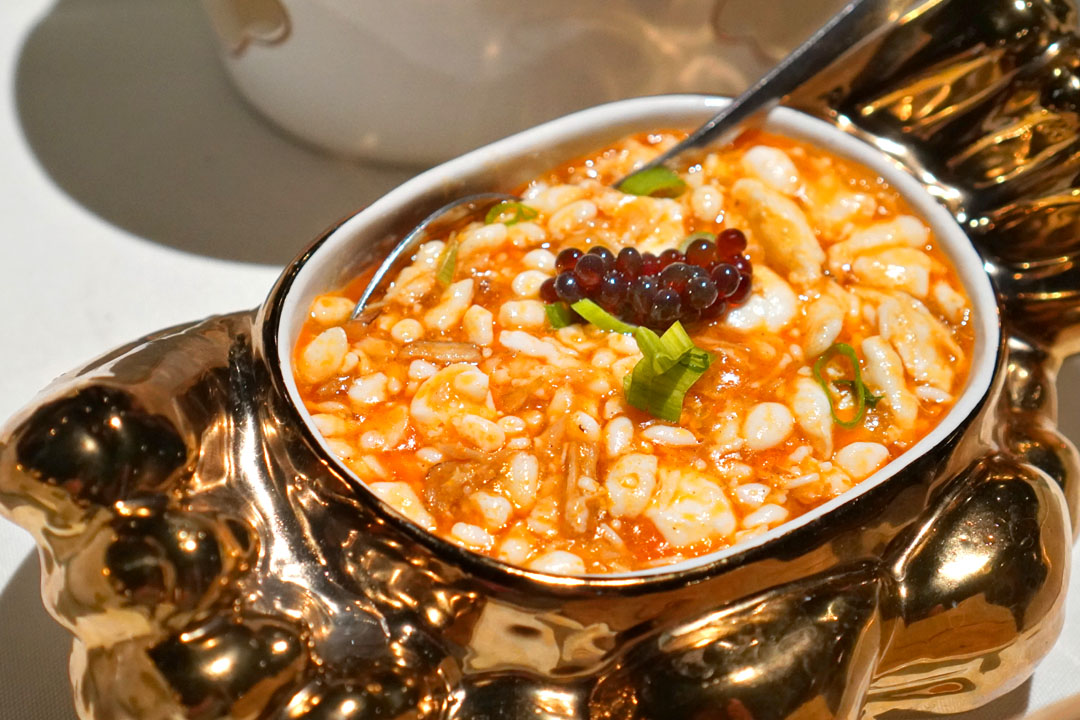
蟹蟹芙蓉 (小) / Crabmeal With Egg White (Small) [$26.00]
Compared to the similar crab dish above, this one conveyed that same delectably sweet brine, but was even more satisfying texturally due to the firmer nature of the egg whites. There was a nice bit of piquancy here as well, which worked great as an accent piece.
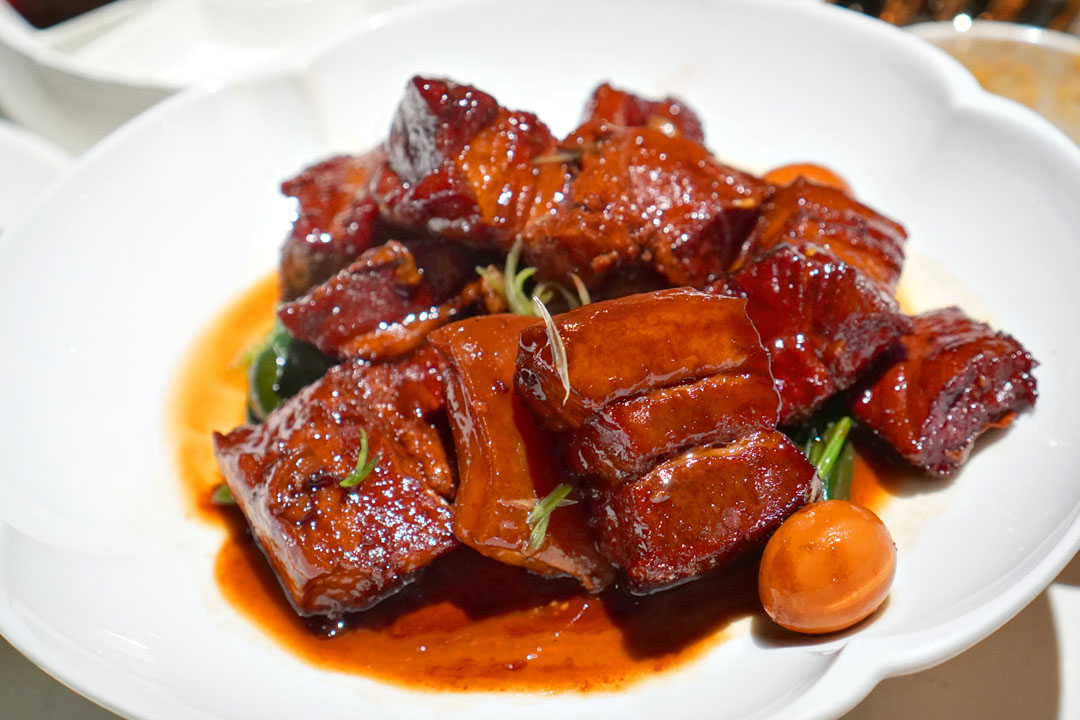
36宴红烧肉 / Array 36 Signature Braised Pork (Small) [$38.00]
Our final savory dish was the hóngshāo ròu, which featured meltingly fatty, gelatinous chunks of red braised pork belly, positively teeming with those classic, sticky, porcine flavors I was looking for.
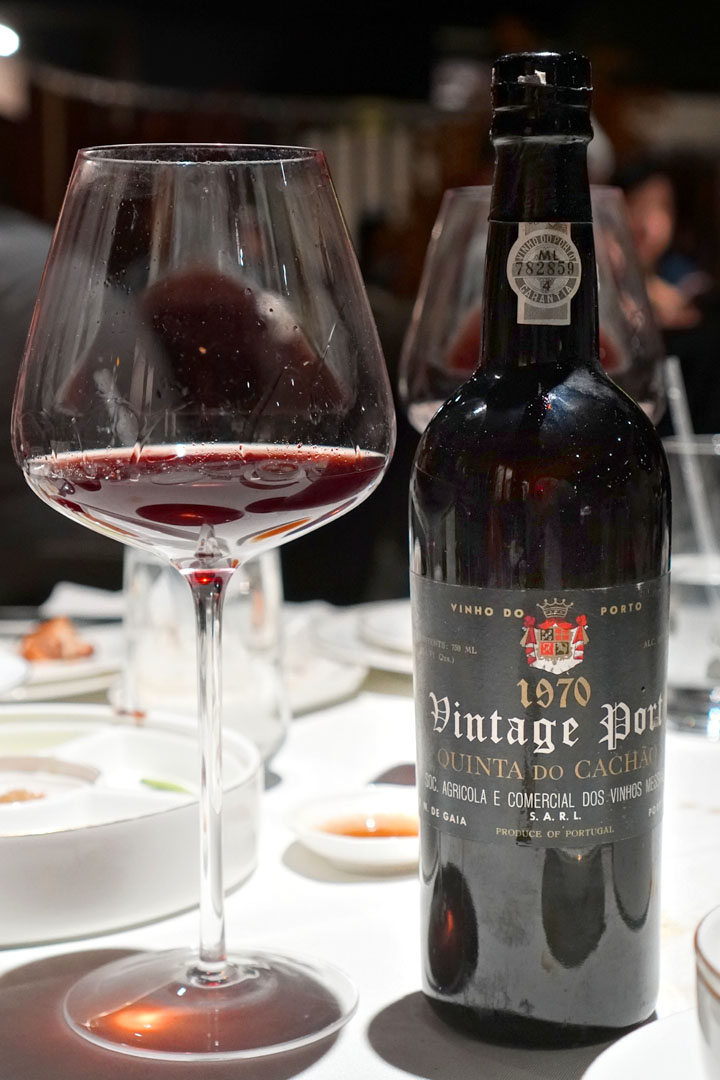
For dessert wine duties, I also brought along the 1970 Caves Messias Porto Vintage Quinta do Cachão, which I was very curious to try. The port displayed an appealing nose rife with chocolate and red fruit, with light florals. In terms of taste, I got tart, jammy fruit all over the place, with surprisingly little tertiary, and overall, I was a bit shocked at how remarkably young and vivacious this tasted despite being over 50 years old.
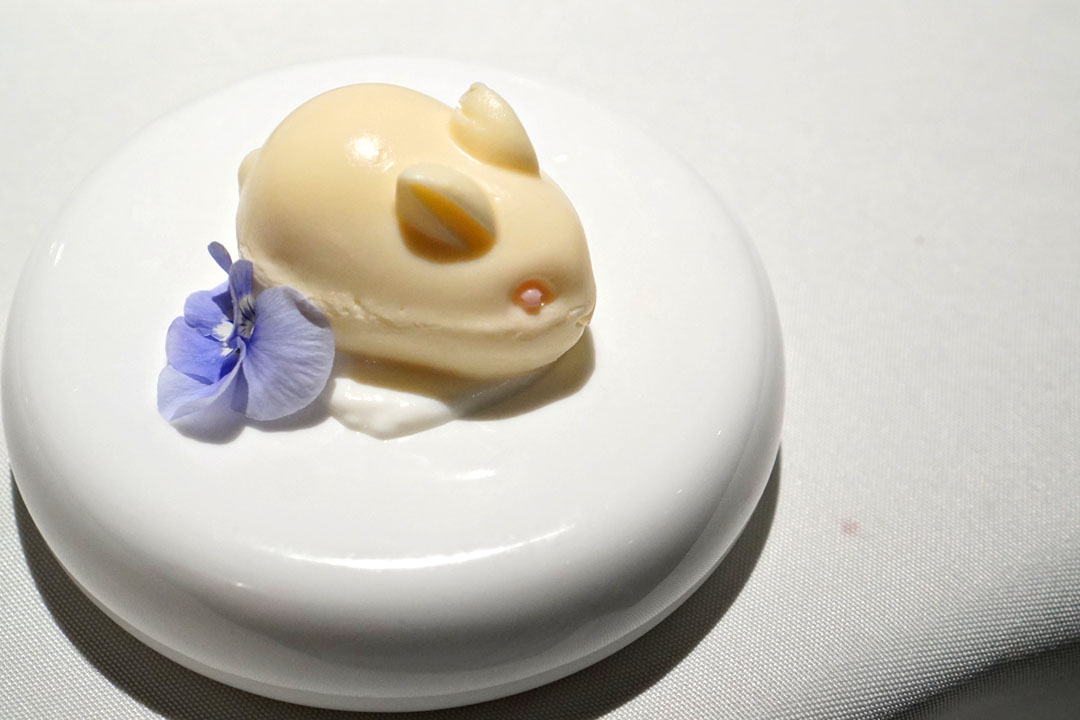
酸奶玉兔慕斯 (个) / Yogurt Bunny Mousse (Each) [$5.00]
This "jade rabbit" dessert exhibited the tangy, lactic qualities of yogurt in a cute, jiggly format.
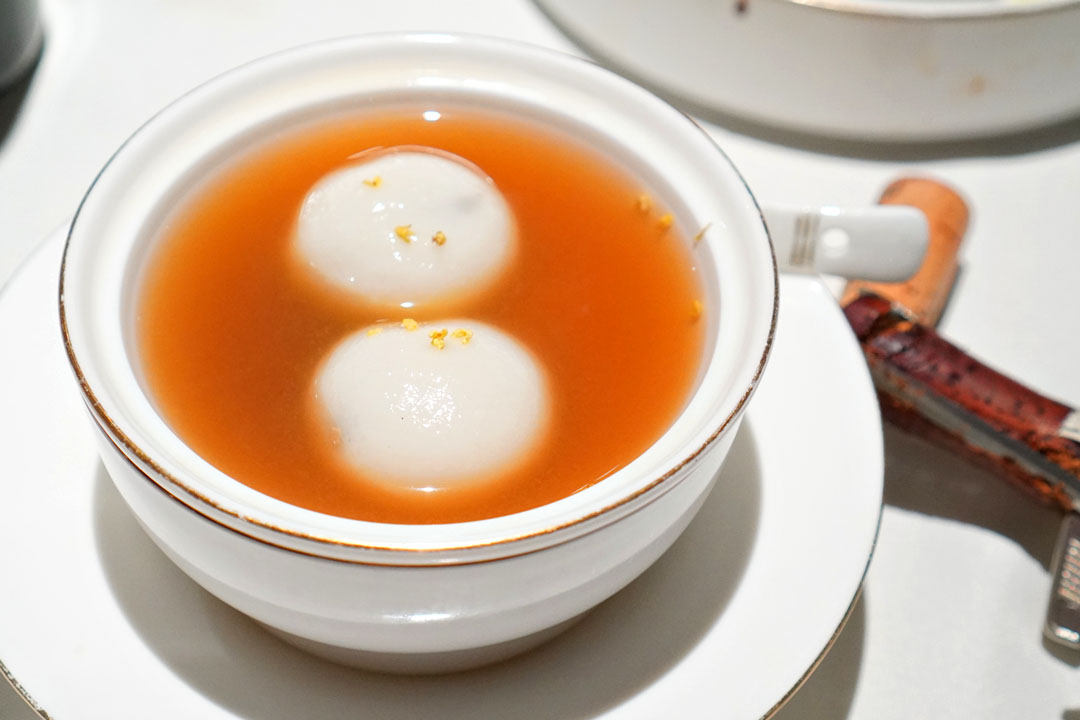
红糖酒酿芝麻汤圆 (2粒) (位) / Red Sugar Sweet Wine Sesame Glutinous Rice Balls (2/pcs) (Per Serving) [$6.00]
Supple spheres of tāngyuán had that nutty sweetness I wanted, all set in a brown sugar-boosted jiǔniàng broth.
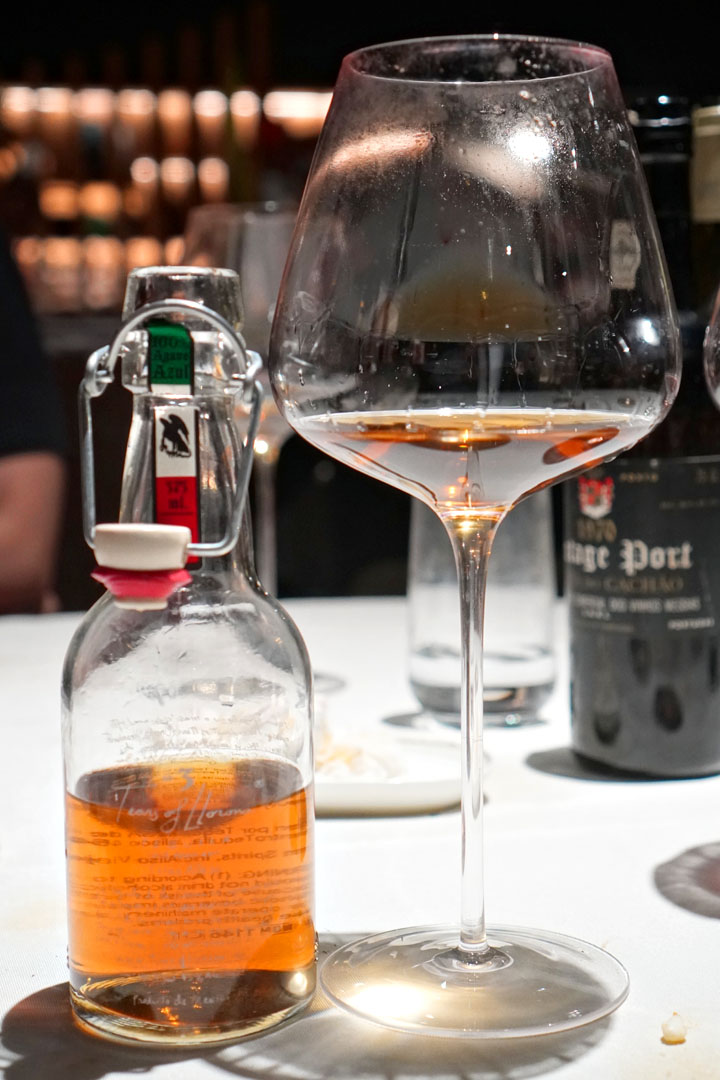
We closed out the evening with a digestif in the form of the Tears of Llorona Tequila Extra Añejo, an extra-aged expression matured for five years in a mix of brandy, scotch, and sherry barrels. The spirit smelled massively of peppery agave, accented by sweet vanilla and oak. Tasting it, I found lots of spice, along with cooked agave, as well as further elements of caramel, orchard fruit, and barrel.
I came into Array 36 with some pretty high expectations, and surprisingly, the restaurant actually managed to exceed them. In fact, I have to imagine that this is the closest we've gotten to a proper fine dining Chinese spot around these parts. I was legitimately impressed by how deep, developed, yet nuanced the flavors were, and I really got a sense of the care and consideration that went into the dishes. Indeed, I think I might've found my new favorite Chinese restaurant in the Los Angeles area--I just hope that the team can keep up the quality in the long-term.